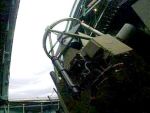|
As astronomers peer ever deeper into outer space and
cosmologists extend their equations to encompass ever more of the universe, as
geneticists unravel the mysteries of our genes and evolutionary biologists
uncover more about the origins and development of life, scientists are answering
questions that once fell to theologians. In this scientific age, we might well
ask what role is there for religion? And how might science and religion work
together?
 For
physicist and theologian Robert Russell - the director of the Berkeley-based
Center for Theology and the Natural Sciences - the two disciplines "need
each other". Although scientists are answering a huge range of questions,
Russell notes that science also "raises questions which are broader than
science can answer." These questions are usually philosophical or moral in
nature: Why is there a universe at all? Why do we find mathematical order in the
world around us? Why does science itself make sense? Why is science of value?
And how can we best put our scientific knowledge to use? According to Russell
these questions require the input not only of scientists, but also of
philosophers, ethicists, and theologians. For
physicist and theologian Robert Russell - the director of the Berkeley-based
Center for Theology and the Natural Sciences - the two disciplines "need
each other". Although scientists are answering a huge range of questions,
Russell notes that science also "raises questions which are broader than
science can answer." These questions are usually philosophical or moral in
nature: Why is there a universe at all? Why do we find mathematical order in the
world around us? Why does science itself make sense? Why is science of value?
And how can we best put our scientific knowledge to use? According to Russell
these questions require the input not only of scientists, but also of
philosophers, ethicists, and theologians.
On the other hand, Russell points out that in the modern
scientific age theologians and religious people cannot afford to ignore what is
going on in science. Christian philosopher Nancey Murphy, of Fuller Theological
Seminary, explains that if religious world views do not seem to be connected to
the concrete universe that science describes, then it is easy to dismiss them.
Indeed the separation of religion from science in the post-Enlightenment era has
done much to undermine religious belief in the Western world. According to
Murphy, in order for religions to maintain the power of their moral teachings
they must be seen to be in harmony with the "truths" of science. In
other words, if you want people to believe what you have to say on moral issues,
Murphy suggests you need them to take your cognitive world picture seriously -
which means, she says, not contradicting the theories of science.
 But
in looking to harmonize religious and scientific world views, Jesuit priest and
astronomer Father George Coyne warns that one must be careful not to let either
side dominate the other. On the one hand Father Coyne notes that "my
scientific investigation has always supported my belief in God in a very real
sense". As a Christian, Coyne believes in the universe as in some sense a
creation of God, hence, he says, God must be reflected in that universe. But at
the same time he stresses that science cannot be used to prove the existence of
God, or as the basis of religious faith. As he explains, "I have never come
to know God, to believe in God though doing science. He is not the conclusion of
some sort of process of my scientific investigation." In the end, Father
Coyne says, faith stands outside science. Yet he notes that once you have faith
then scientific discoveries can be a wonderful way of affirming that faith, by
showing you the marvelous beauty and order in the universe. But
in looking to harmonize religious and scientific world views, Jesuit priest and
astronomer Father George Coyne warns that one must be careful not to let either
side dominate the other. On the one hand Father Coyne notes that "my
scientific investigation has always supported my belief in God in a very real
sense". As a Christian, Coyne believes in the universe as in some sense a
creation of God, hence, he says, God must be reflected in that universe. But at
the same time he stresses that science cannot be used to prove the existence of
God, or as the basis of religious faith. As he explains, "I have never come
to know God, to believe in God though doing science. He is not the conclusion of
some sort of process of my scientific investigation." In the end, Father
Coyne says, faith stands outside science. Yet he notes that once you have faith
then scientific discoveries can be a wonderful way of affirming that faith, by
showing you the marvelous beauty and order in the universe.
Email
link | Feedback
| Contributed by: Margaret Wertheim
|







